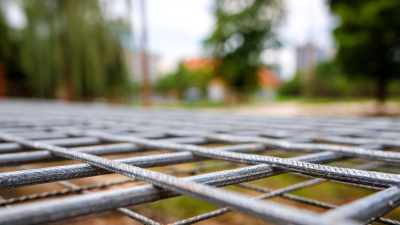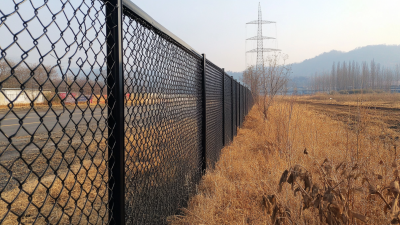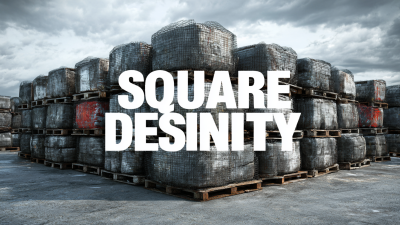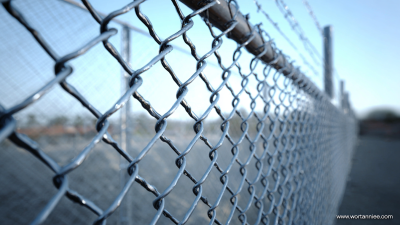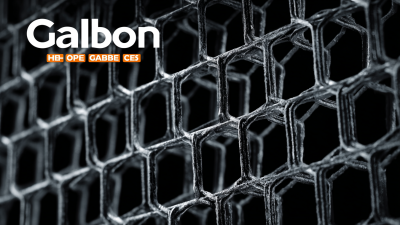Leave Your Message
-
Telephone
-
WeChat/ WhatsApp
-
Email
In recent years, the demand for PVC Coated Welded Mesh has surged, driven by its versatility and durability across various industries. Reports from the Global Mesh Market indicate a projected growth rate of over 6% annually, highlighting the increasing adoption of this material in applications ranging from construction to agriculture and fencing.

PVC Coated Welded Mesh offers superior corrosion resistance, enhanced aesthetic appeal, and long-lasting performance, making it a preferred choice for professionals seeking reliable solutions. As industries continue to prioritize sustainability and efficiency, understanding the optimal use and applications of PVC Coated Welded Mesh becomes paramount.
This guide aims to provide a comprehensive checklist for mastering the installation and utilization of this innovative material, ensuring that users can leverage its benefits to meet their specific needs effectively.
 PVC coated welded mesh is increasingly popular in various applications due to its unique advantages over traditional uncoated options. Its construction involves welding wire strands at intersections and then applying a layer of PVC coating, which enhances durability and corrosion resistance. According to industry reports, the demand for PVC coated welded mesh is projected to grow at a CAGR of 4.8% through 2026, driven by its applications in construction, agriculture, and landscaping.
PVC coated welded mesh is increasingly popular in various applications due to its unique advantages over traditional uncoated options. Its construction involves welding wire strands at intersections and then applying a layer of PVC coating, which enhances durability and corrosion resistance. According to industry reports, the demand for PVC coated welded mesh is projected to grow at a CAGR of 4.8% through 2026, driven by its applications in construction, agriculture, and landscaping.
One of the primary advantages of PVC coated welded mesh is its long-lasting performance, which significantly reduces maintenance costs. The PVC coating adds a protective layer, preventing rust and ensuring the mesh can withstand harsh environmental conditions. Additionally, it is available in a variety of colors, making it suitable for aesthetic applications as well. When selecting PVC coated mesh, consider factors like wire gauge and coating thickness to match your specific use case.
Tip: When installing PVC coated welded mesh, ensure that the surface is clean and dry to promote better adhesion and longevity of the coating. Regularly inspect the mesh for any signs of wear or damage to maintain its integrity over time.
When selecting PVC coated welded mesh, it's essential to understand the various types available and their specific features. There are generally three prominent types: standard PVC coated welded mesh, heavy-duty PVC coated mesh, and high-strength PVC coated mesh. The standard type offers a good balance between cost and durability, making it suitable for residential applications. According to a market report from Allied Market Research, the global demand for PVC coated products is expected to reach $5.4 billion by 2025, reflecting their increasing popularity across various sectors.
Heavy-duty PVC coated welded mesh, on the other hand, is designed for industrial contexts where higher strength and resistance to environmental factors are required. It typically features thicker wires and a more robust coating, improving its lifespan and aesthetic appeal in commercial settings. The coating thickness in heavy-duty options can vary from 0.5mm to over 1mm, providing significant resistance to corrosion. Furthermore, high-strength variants are engineered using advanced technologies and may consist of specialized materials, thereby achieving tensile strengths that exceed 300 MPa, making them ideal for demanding applications such as fencing, safety barriers, and industrial enclosures.
| Type of PVC Coated Welded Mesh | Wire Diameter (mm) | Mesh Size (inches) | Coating Thickness (mm) | Color Options | Common Applications |
|---|---|---|---|---|---|
| Standard PVC Coated Mesh | 1.2 | 2x4 | 0.4 | Green, Black | Fencing, Garden Use |
| Heavy-Duty PVC Coated Mesh | 2.5 | 4x4 | 0.6 | Blue, Yellow | Construction, Industrial Use |
| Lightweight PVC Coated Mesh | 0.8 | 1x3 | 0.3 | Black, White | Pet Enclosures, Decorative Uses |
| Corrosion-Resistant PVC Coated Mesh | 1.5 | 3x5 | 0.5 | Green, Gray | Parks, Landscaping |
PVC coated welded mesh is a versatile material with a wide array of applications across various industries. Its robust nature and resistance to corrosion make it ideal for use in construction, agriculture, and environmental management. For instance, in the agricultural sector, PVC coated welded mesh is often utilized for fencing and animal enclosures, providing both security and durability. Additionally, its application in wastewater treatment is gaining momentum, particularly with innovative modifications to enhance mesh wettability, making it effective in harvesting atmospheric and industrial fog.
Tips: When selecting PVC coated welded mesh for specific applications, consider the thickness and mesh size to ensure it meets your project's requirements. For environmental applications, opt for a mesh design that maximizes surface area to improve performance in moisture collection and filtration processes.
Another emerging application is in the solar energy industry, where PVC coated meshes can serve as the supporting structure for photovoltaic panels. By ensuring proper installation and maintenance, you can significantly extend the lifespan and efficiency of solar energy systems.
Tips: Regularly inspect your installed mesh for any signs of wear or damage, especially in high-stress environments. Proper cleaning techniques can also enhance the performance of the coated mesh and prevent the buildup of pollutants that may affect its functionality.
Maintaining PVC coated welded mesh is essential for ensuring its longevity and optimal performance. Regular inspections are crucial to identify any signs of wear or damage. Look for fading colors, rust spots, or breaks in the mesh. Addressing these issues promptly can prevent further deterioration and extend the life of your mesh.
When it comes to cleaning, a simple solution of soap and water is often sufficient. Use a soft brush to gently remove dirt and grime without scratching the PVC coating. Avoid harsh chemicals that can compromise the integrity of the mesh. After cleaning, rinse with clean water to remove any soap residue and allow it to dry completely to prevent moisture buildup.
Additionally, consider applying a protective layer of UV-resistant sealant if your mesh is exposed to direct sunlight for extended periods. This can help shield the PVC coating from ultraviolet degradation, ensuring its vibrant appearance and structural strength over time. Regular maintenance not only enhances the aesthetic appeal but also optimizes the mesh's functionality for various applications.
When evaluating the cost-effectiveness and value of PVC coated welded mesh compared to traditional materials, it is essential to consider not only the initial investment but also the long-term benefits they offer. PVC coated welded mesh is known for its durability and resistance to environmental factors, which can result in lower maintenance costs over time. Unlike conventional materials that may require frequent replacement or extensive upkeep, the longevity of PVC coated mesh leads to significant savings, particularly in applications like fencing, reinforcement, and industrial containment.
Additionally, as sustainability becomes a focal point in manufacturing, the potential for high-value recycling plays a crucial role in material selection. Recent studies emphasize advancements in recycling technologies, such as the pyrolysis process for organic coatings on materials like wire, highlighting the growing emphasis on resource recovery and waste reduction. In contrast to traditional materials that may not have clear recycling pathways, PVC coated welded mesh can be an environmentally sound choice, aligning with current trends towards bio-based and recyclable options. This not only caters to economic considerations but also contributes to broader sustainability goals, making PVC coated welded mesh a compelling alternative in various applications.

